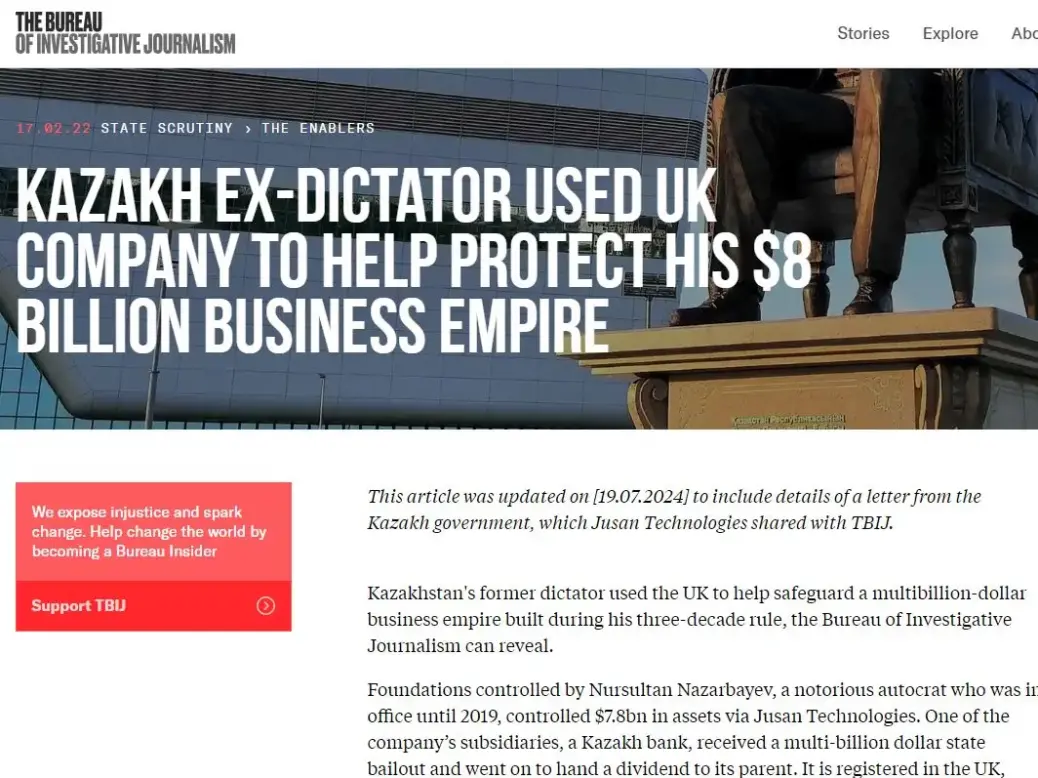
A libel claim brought against The Bureau of Investigative Journalism by a UK-based investment holding company which objected to reporting about its alleged links to a former president of Kazakhstan has been dropped after two years.
It means TBIJ, The Telegraph and Open Democracy have all settled libel claims brought by Jusan Technologies Ltd over similar reporting.
TBIJ was the last to settle with Jusan, with a fixed sum in costs to be paid. Although terms are confidential, Press Gazette understands the publisher is pleased with the result. The case was first filed in the High Court in August 2022.
TBIJ has kept up its article, headlined “Kazakh ex-dictator used UK company to help protect his $8 billion business empire” in reference to Nursultan Nazarbayev, but added several notes at the bottom.
Most recently, after the settlement was agreed, it added details of a letter from the Kazakh government shared by Jusan.
It read: “Kazakhstan ‘found no direct or indirect link between any of the above-mentioned companies, its officers, or directors and Mr Nursultan Nazarbayev or his family, nor evidence of any misappropriation of public funds,’ the letter said. Nazarbayev drew no financial benefit from any of the companies and ‘has no control over, or affiliation with, those entities,’ it said.”
TBIJ’s chief executive and editor-in-chief Rozina Breen said: “The case has been dropped and our article is still up. I’m delighted that we fought this case and stood behind our article, with the courage and conviction of our journalism.
“It’s what the Bureau does best – reporting in the public interest, without fear or favour. We remain committed to public interest journalism and will continue to hold the rich and powerful to account.”
TBIJ had filed a defence relying on the public interest, honest opinion and statutory qualified privilege.
Jusan had also brought the claim over a second article which reported on a Parliamentary debate about lawsuits designed to intimidate in which the case was cited, which TBIJ was planning to defend under qualified privilege and the public interest.
It had also maintained that neither article contained a defamatory meaning.
Open Democracy, which was also the subject of a libel claim by Jusan over its own January 2022 reporting, updated its article in June to say there had been a settlement.
It said: “Open Democracy is content to record that the article was written about JTL prior to its restructuring in late 2021, since which time it has been directly owned by registered corporations in the United States and since which time the composition of its board of directors has changed.
“JTL maintains that the claim was brought in good faith.
“We place this on the record and report that OD and JTL have settled the libel proceedings.”
However The Telegraph, the third publisher pursued by Jusan, has taken down its own article which was subject to libel action.
Another note on the TBIJ article says: “The article was amended to reflect that the Telegraph has removed a related article. This was following the settlement of a claim brought by Jusan Technologies against the Telegraph.”
Jusan denied TBIJ legal threat was a ‘SLAPP’
The cases had been characterised as strategic litigation against public participation, or SLAPPs – defined by the Solicitors Regulation Authority as an “alleged misuse of the legal system, and the bringing or threatening of proceedings, in order to harass or intimidate another who could be criticising or holding them (to) account for their actions and thereby discouraging scrutiny of matters in the public interest”.
The Council of Europe issued a media freedom alert citing the claims.
However Justin Rushbrooke KC, who led Jusan’s legal team, told a hearing last year that the claims had “none of the hallmarks” of SLAPPs.
He said Jusan had pursued the claims “out of necessity” and did so “reluctantly”.
Breen told Press Gazette earlier this year that TBIJ is being forced to spend more on fighting legal threats and that it gets around 20 to 30 legal letters a year.
She said it is “definitely a pressure and a stress point and takes time and energy”.
[Read more: Bureau of Investigative Journalism in drive to diversify grant-led funding model]
In October last year a judge made a preliminary ruling on the meanings of the Telegraph and Open Democracy articles. Law firm 5RB, for whom Rushbrooke works, said Mr Justice Johnson “rejected submissions by the publishers that the articles conveyed merely that JTL was an unwitting and passive receptacle for Mr Nazarbayev’s funds, which (as was common ground between the parties) were alleged to have been corruptly acquired”.
But it was a mixed judgment, with Open Democracy noting that “the Court accepted that nowhere in the article had the article suggested in terms that JTL had done anything improper and ruled that while the article did not convey the serious defamatory meaning about JTL that JTL had believed it conveyed, it did contain a meaning that was defamatory of the company”.
An anti-SLAPP Private Members Bill backed by the Government was going through Parliament this year but was not far enough through to survive the wash-up period when Rishi Sunak unexpectedly called the general election.
However, as then-Culture Secretary Lucy Frazer explained in an op-ed for Press Gazette last year, the Economic Crime and Corporate Transparency Bill was amended to “clamp down on SLAPPs linked to economic crime, which are believed to make up 70% of these cases, by allowing judges to throw them out more easily and place a costs cap on those targeted”.
Email pged@pressgazette.co.uk to point out mistakes, provide story tips or send in a letter for publication on our "Letters Page" blog
